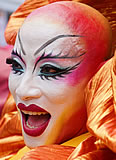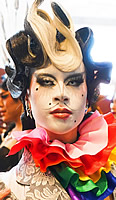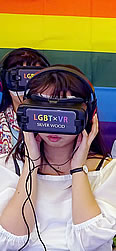On Vietnamese Terms for Homosexuality...
a posting by Vinh N. on the VN-GBLF E-mail forum
DDo^`ng ti'nh luye^'n a'i" is a literal translation via Chinese of that modern neologism "homosexuality" which dates back to but 1869. It's entry date into the Vietnamese language isn't very clear to me, but I suspect fairly late by comparison: it did NOT appear in DDa`o Duy Anh's Ha'n Vie^.t Tu+. DDie^?n of 1931, but did appear in his Pha'p Vie^.t Tu+. DDie^?n of 1936, and might have limited currency in the journalistic vocabulary of the 1930s. I haven't been able to find any earlier appearance/usage of this word prior to the 1930s. I believe that this word only came into greater vogue/currency with the explosive introduction of Western psychology (not so much the Freudianism which had come in the 1920s, but the pop/family kind which became greatly popular in the 1940s onward) and sexology: especially the boom in sex education/hygiene primers/manuals in the 1950s/60s. This term is distinctively "clinical" in flavor: and it seemed to have limited currency in criminal records, since the practice was not criminalized in Vietnam, or at least never quite so explicitly, until quite late (if at all: a friend of mine who's a journalist in Vietnam and who had written a few features on the subject did tell me, though without concrete documentary evidence, that there are officially laws against it in Communist Vietnam, but I can't tell for sure until I can find documentary evidence in my hand to prove it one way or the other).
A'i nam a'i nu+~" (or "a' nam a' nu+~") is probably the closest descriptive approximation to what is meant ontologically (and perhaps even behavorially if one takes "a'i" as a verb -- but then the total meaning of the term is rather misleading/misguided since it'll be closer to what's understood in English as "bisexual" behavior). The earliest usage of this term that I can find so far is the 1940s. Another variation on this term, which is more common in biological/medical vocabulary, is "ba'n nam ba'n nu+~", which, like the others, means literally "part/half man and part/half woman".
Bo'ng la.i ca'i" is obviously an underground slang. I suspect that it's associated with cult practices of "ddo^`ng bo'ng". There are many conflicting semantic and cultural exegeses on the various (high-charged) terms: "bo'ng", "la.i" and "ca'i" (as well as "ddo^`ng bo'ng" and "ddo^`ng co^ bo'ng ca^.u", "con ba` co^", though probably NOT "co^ ho^`n ca'c dda(?ng" as usually understood, etc.) This term, if it's associated at all with quasi-shamanistic/spirit-cult practices ("ddo^`ng bo'ng", "vi'a co^'t" etc.) then its flavor is distinctly more ontological, even though it can also have a behavorial dimension in the figurative sense that is used for homosexuals/hermaphrodites and other sexually ambiguous/queer categories of people. I am unable to date this term (and its host of derivatives/correlates), even though it surely predates the 1960s. "Bo'ng" and "la.i ca'i" are the most common abbreviated correlates of this term (even though "la.i ca'i" very often stands on its own with regards to gay male, given its literal meaning of "contaminated with the feminine" -- but then can be used as a byword for "effeminacy" which isn't exclusive or even characteristic of gay males at all, as we all know! :-))
Pe^ dde^" ("pe'de'", short for the French "pe'deraste" whose English counterpart is the Latinate cognate "pederast") is probably the most common modern/contemporary (post 1950s/60s?) byword for a gay person in Vietnam. It's probably urban in origin/scope and can probably be dated to the French usage of the word (albeit much less commonly than the pervasive "inverti" which doesn't seem to have a literal correlate in Vietnamese: its English correlate is the less commonly used "invert").
Ke^ gian" is a much more ancient term, borrowed from Chinese (and dating back quite a few centuries), which is mostly used to depict the anal kind of "sodomy". It's a description of the act, and not so much a person. Needless to say, it was included in earlier Sino- Vietnamese dictionaries (the earliest instance of which I have been able to date to 1898). But then, as is made clear in both the Chinese and Vietnamese context, "ke^ gian" can often mean a generic term for the tabooed kind of "anal intercourse" and not limited to same-sex practice. (And in medieval Europe the term had been used broadly to encompass all sexual deviancy, including bestiality, so there!).
![[BACK A PAGE]](backm.gif) ![[HOME PAGE]](homopage.gif)
|











![[HOME PAGE]](homopage.gif)